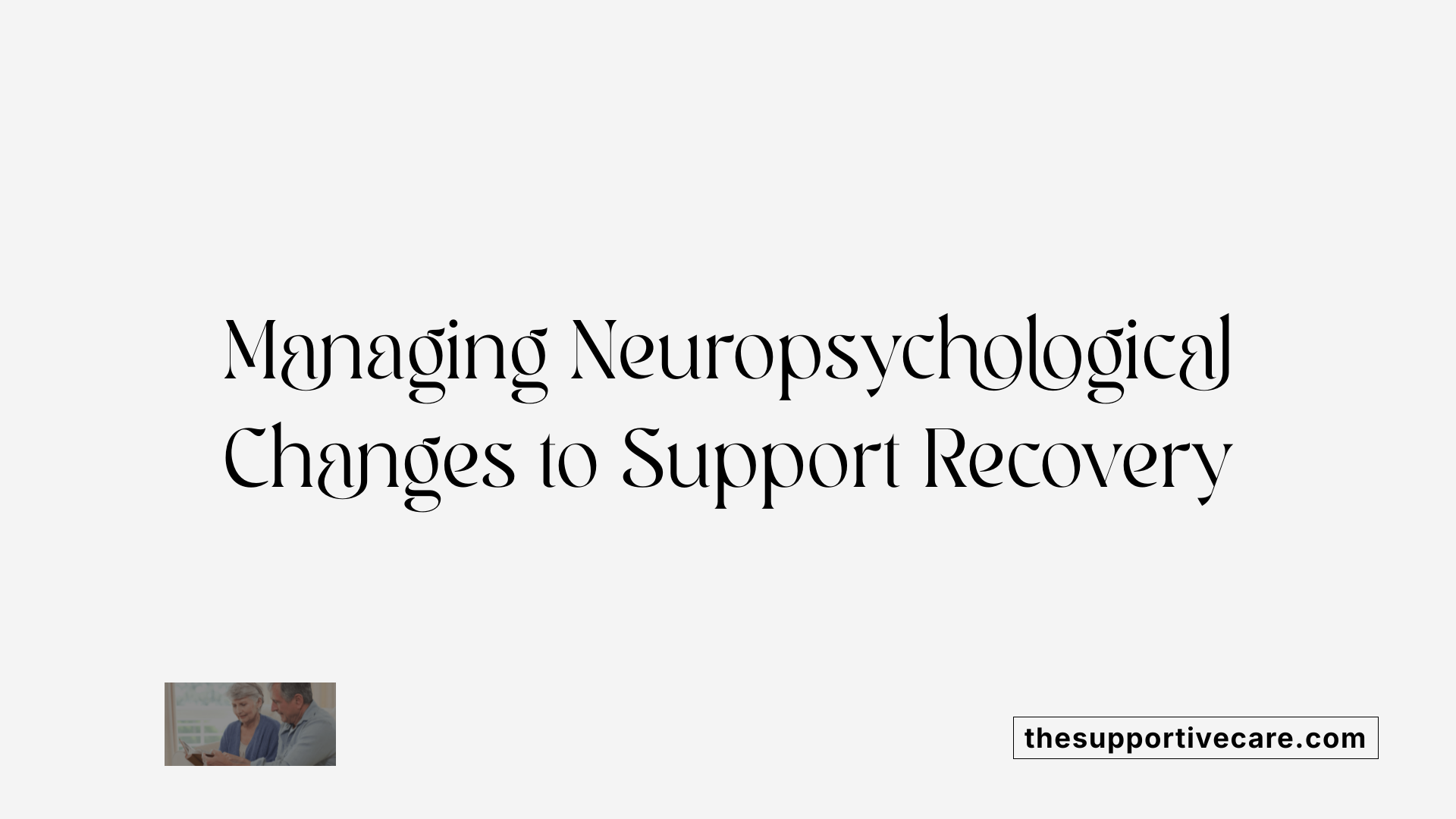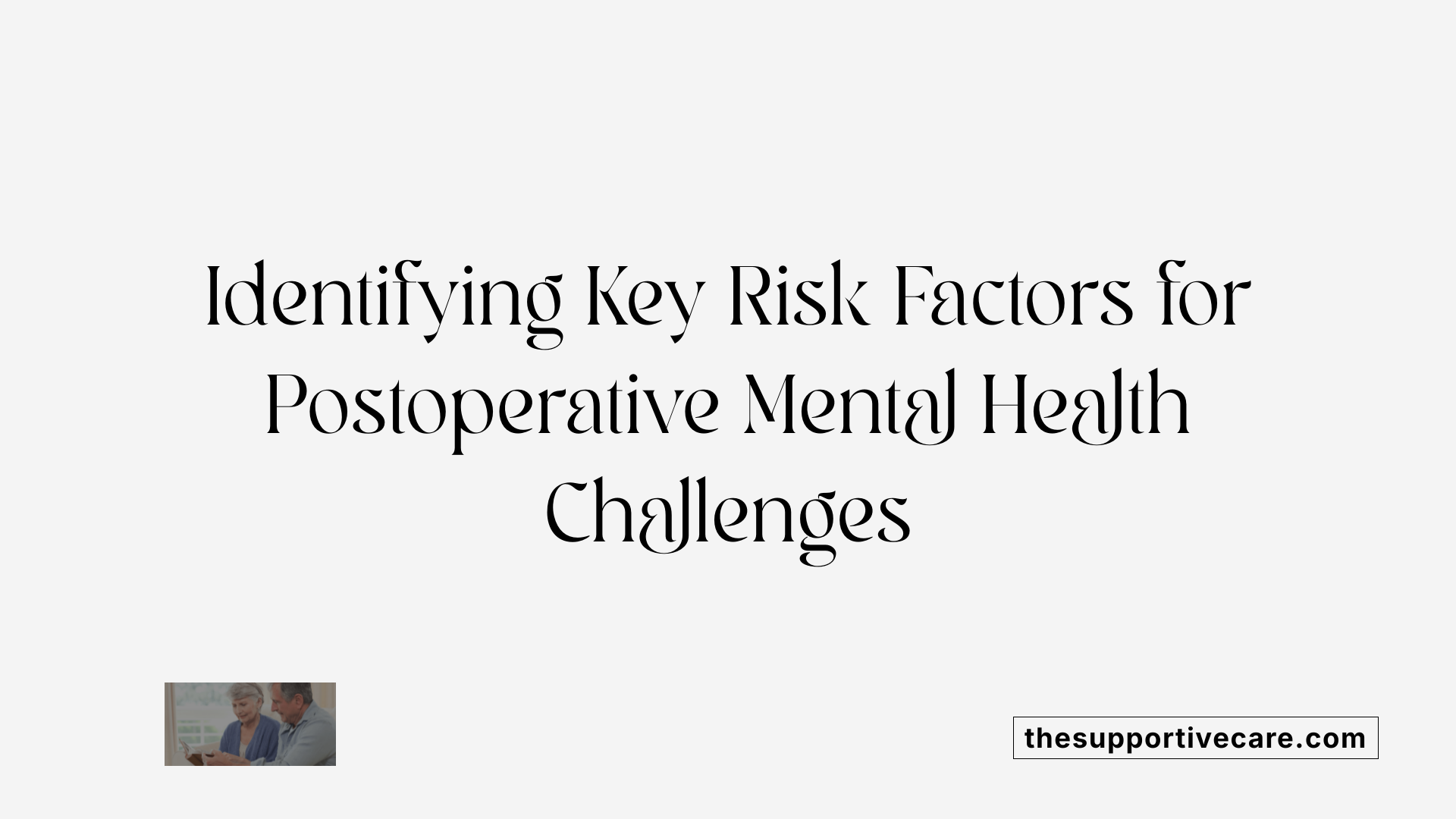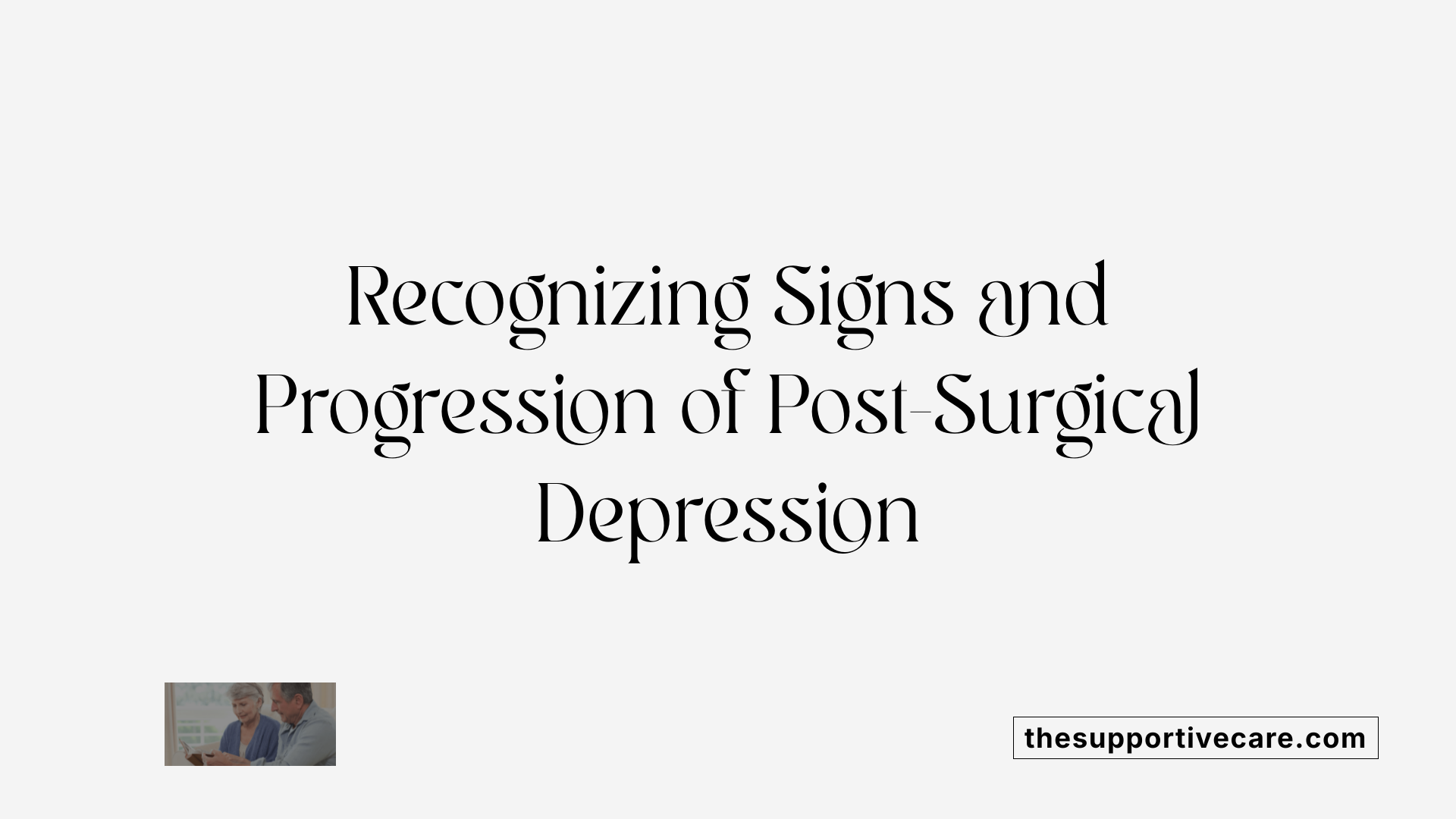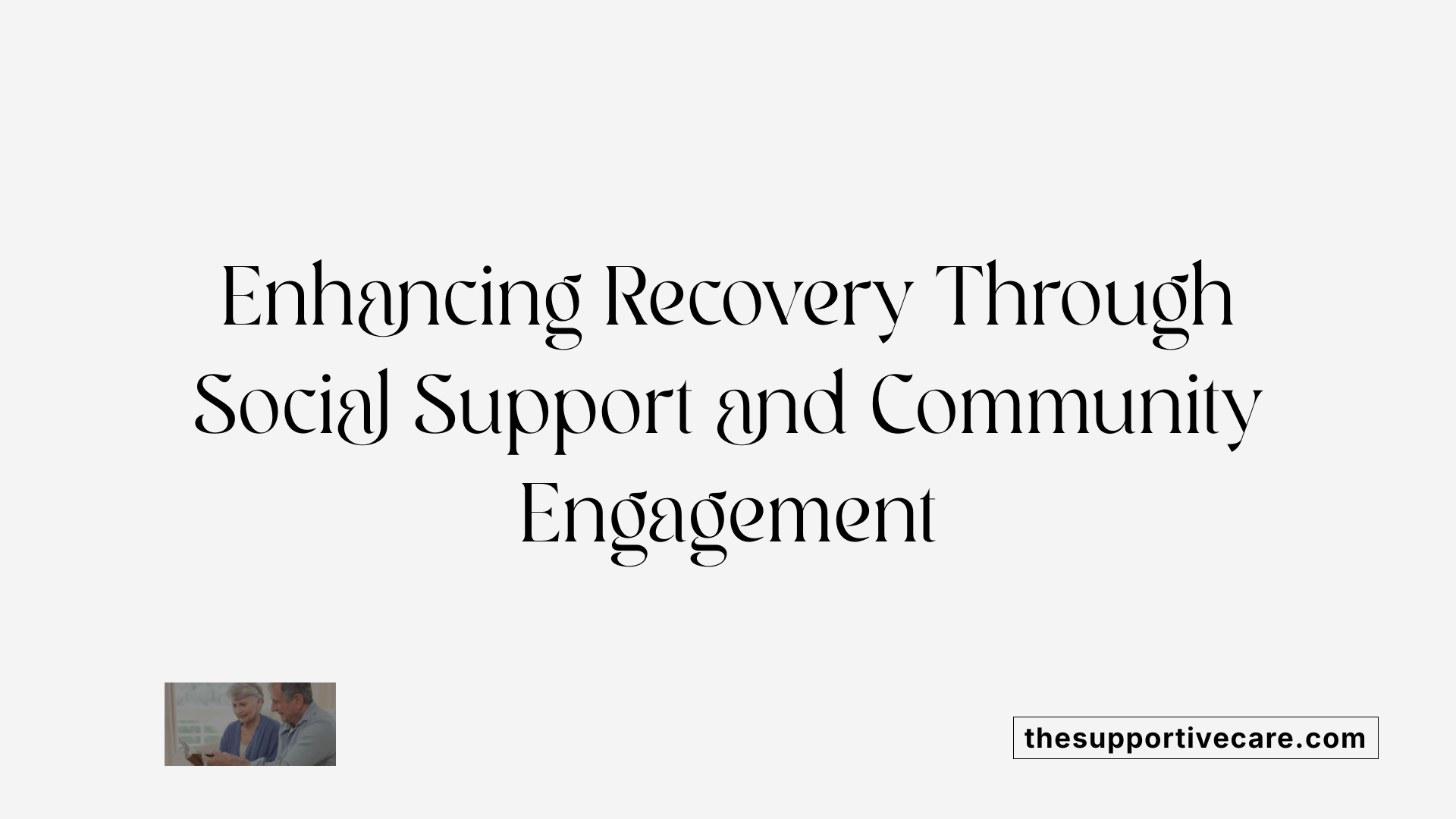An Overview of Mental Health in Elderly Post-Surgery Recovery
Seniors undergoing surgery face a complex interplay of physical and psychological challenges. While surgical success is often measured by physical outcomes, mental health recovery remains a critical component influencing overall well-being and rehabilitation. This article explores the common psychological issues, their risk factors, symptoms, and management strategies pertinent to elderly patients during post-surgical recovery.
Mental Health Challenges Faced by Seniors Post-Surgery
What mental health challenges do seniors face during post-surgery recovery?
Older adults undergoing surgery often encounter a range of psychological issues that can complicate their recovery process. Anxiety and depression are particularly prevalent, with estimates indicating that during the perioperative period, between 5% and 45% of seniors experience significant anxiety, while depression affects approximately 6% to 52%. These mental health concerns are not just emotional struggles; they are associated with tangible physical health risks.
Seniors face higher risks of postoperative complications when anxiety and depression are present. These include the development of delirium, cognitive disturbances like confusion, as well as longer hospital stays and greater chances of rehospitalization. In some cases, these psychological conditions can influence the overall trajectory of recovery, affecting physical functioning and the ability to participate fully in rehabilitation.
Depressive symptoms in seniors are often rooted in pre-existing mental health histories, but they can be triggered or worsened by the stress of surgery. Common contributing factors include pain, discomfort, sleep disturbances, and emotional stress from loss of independence and altered body image. The severity of depression post-surgery is typically higher among those over 80 years old or those dependent on help with daily activities.
Postoperative depression can manifest as persistent sadness, hopelessness, loss of interest in activities, irritability, sleep or appetite changes, cognitive issues, and even thoughts of self-harm. If left unaddressed, these conditions do not only diminish quality of life but can also lead to physical complications such as slowed recovery, increased pain perception, and further cognitive decline.
Despite the serious nature of these issues, there is a lack of targeted perioperative interventions specifically aimed at managing mental health in these patients. Interventions such as behavioral activation—encouraging engagement in meaningful activities—and medication optimization are promising strategies. These approaches aim to reduce harmful or unnecessary medication use and to promote psychological well-being.
Supporting seniors’ mental health involves routine establishment, fostering social connections, and encouraging positive mental practices like music therapy, reminiscence, and joyful activities. Professional support through counseling and family involvement, along with social programs, can significantly bolster a senior’s emotional resilience.
In overview, addressing the mental health needs of older surgical patients is crucial for improving their recovery outcomes and overall well-being. Ongoing research and clinical programs are essential to develop and implement effective, personalized mental health interventions in the perioperative setting, ensuring seniors are supported physically and emotionally throughout their recovery journey.
Common Psychological Issues in Elderly Surgical Patients
What are common psychological issues experienced by elderly patients after surgery?
Seniors undergoing surgery often face a variety of psychological challenges that can influence their recovery process and overall well-being. The most common issue is delirium, which affects up to half of older adults post-surgery. Delirium manifests as confusion, hallucinations, disorientation, agitation, and agitation, often occurring within hours or weeks after the procedure. While it is usually reversible and preventable in many cases, its symptoms can be mistaken for dementia, complicating diagnosis and management.
Alongside delirium, anxiety and depression are highly prevalent among older surgical patients. Studies estimate that between 5% and 52% of seniors experience anxiety or depression during the perioperative period. These psychological issues are linked to factors such as pain, existing health conditions, sleep disturbances, and fears related to surgery. They can contribute to slower recovery, increased risk of complications, and poorer engagement in rehabilitation activities.
Postoperative depression is usually characterized by persistent sadness, hopelessness, loss of interest in activities, irritability, sleep changes, appetite loss, cognitive disruptions, and thoughts of self-harm. It can intensify if untreated, leading to higher risks of infection, chronic pain, and cognitive decline. Cognitive issues like postoperative cognitive dysfunction (POCD) are also recognized; they cause impairments in memory, attention, and decision-making that may linger weeks or even years post-surgery.
Other psychological complications include fear of the unknown, body image concerns, and social isolation, particularly in those who lack strong social support networks. These emotional stresses can lead to a decline in functional independence and overall quality of life if not properly addressed.
What are the prevalence and risk factors?
Research indicates that more than half of the older adults facing major surgery report preoperative depressive symptoms, which are strongly linked to poorer recovery outcomes. The prevalence of anxiety and depression during the perioperative period ranges from 6% to over 50%, varying by surgical type and patient population.
Certain factors significantly increase the risk of psychological issues after surgery. These include advanced age (especially over 80), dependence on activities of daily living (ADL and IADL), pre-existing mental health conditions, and social factors such as loneliness. Studies have also highlighted that loneliness notably increases postoperative mortality risk, with odds rising by 76% for each point increase in loneliness scores in non-elective surgeries.
Other risks comprise medical comorbidities like pain, insomnia, and existing cognitive impairment. The use of central nervous system (CNS) active medications such as benzodiazepines, anticholinergics, and opioids further heightens risks, especially for delirium and falls.
How do these psychological issues affect recovery?
The influence of psychological issues on recovery is profound. Anxiety and depression can decrease motivation and participation in necessary rehabilitation activities, slow wound healing, and increase the likelihood of postoperative complications. Delirium, if unmanaged, can lead to longer hospital stays, increased use of healthcare resources, and higher morbidity.
Persistent depression and delirium contribute to poor functional outcomes, including diminished independence and quality of life. Post-surgical cognitive decline may also hinder an individual’s ability to regain previous levels of functioning, leading to long-term disability or institutionalization.
Proper management of psychological health is essential for optimizing recovery. Strategies like multidisciplinary care, early screening, family and social support, and psychological interventions play vital roles in mitigating these issues.
| Psychological Issue | Prevalence Range | Main Contributing Factors | Impact on Recovery |
|---|---|---|---|
| Delirium | Up to 50% | Pre-existing cognitive issues, medications, infection, sleep disturbances | Longer hospitalization, increased morbidity |
| Anxiety | 5–45% | Pain, fear, lack of control, medical comorbidities | Slower rehab participation, higher complications |
| Depression | 6–52% | Functional dependence, loneliness, pain, stress | Reduced motivation, poorer outcomes |
| Cognitive Dysfunction | Not precisely measured | Aging, pre-existing cognitive decline | Long-term disability, quality of life reduction |
Understanding these psychological challenges and their underlying factors enables healthcare providers to develop targeted interventions to support older adults through their surgical journey. Implementing proactive screening, family involvement, and tailored psychological care can significantly improve recovery experiences and outcomes for seniors.
Cognitive and Emotional Changes After Surgery

How do cognitive and emotional states change in seniors after surgery?
Seniors often experience notable shifts in their cognitive and emotional health following surgery. These changes can manifest in various ways, including the development of neurocognitive disorders such as delirium and postoperative cognitive dysfunction (POCD). Delirium is the most common psychological complication, characterized by sudden confusion, disorientation, hallucinations, agitation, and fluctuating levels of consciousness. It can occur within hours or days after surgery and may last from a few days to several weeks. If not managed properly, delirium increases the risk of long-term cognitive decline, worsened functional abilities, and even higher mortality rates.
In addition to delirium, some seniors develop POCD, a subtler but persistent decline in mental functions such as memory, attention, and executive functions. This form of cognitive impairment can persist for weeks, months, or even years post-surgery, significantly impacting their independence and quality of life.
Several factors influence these cognitive and emotional changes. Advanced age, pre-existing cognitive issues like mild cognitive impairment, the complexity of the surgical procedure, and postoperative complications heighten the risk. For example, surgeries such as hip replacements, brain surgeries, or cardiac procedures tend to carry higher risks for psychological and cognitive repercussions.
Preoperative assessments aiming to identify at-risk individuals play a vital role. Strategies like cognitive screening, optimizing medical conditions, and minimizing use of medications known to impair cognition can help mitigate these risks. Furthermore, implementation of targeted perioperative interventions—such as delirium prevention protocols and cognitive stimulation activities—can improve outcomes.
Understanding these neuropsychological and emotional shifts is crucial because they directly influence the recovery trajectory and long-term brain health of older adults. Managing and supporting seniors through tailored care approaches can lead to better functional recovery and overall well-being.
What are the long-term impacts of cognitive and emotional changes?
The long-term consequences of postoperative cognitive and emotional disturbances in seniors are profound. For some, initial episodes of delirium or POCD can evolve into persistent neurocognitive disorders, impacting daily functioning and independence.
Long-lasting impairments may include difficulties with memory, concentration, problem-solving, and decision-making. These issues often lead to decreased participation in social activities and increased dependence on caregivers.
Additionally, emotional impacts such as depression and anxiety are common, which can further impair recovery. Untreated psychological distress can also increase the risk of rehospitalization, decline in physical health, and higher mortality.
Research indicates that early detection and intervention are essential to minimize these long-term effects. Strategies like cognitive training, physical activity, social engagement, and appropriate medication management play pivotal roles in recovery.
In summary, cognitive and emotional changes post-surgery can have lasting repercussions that extend well beyond the immediate postoperative period. A comprehensive, multidisciplinary approach is necessary to support seniors in maintaining their mental health and quality of life in the long run.
Risk Factors for Mental Health Problems in Elderly Surgical Patients

What are the risk factors for mental health problems in seniors during post-operative recovery?
Older adults face numerous mental health challenges following surgery, and various factors increase their vulnerability. Pre-existing mental health conditions, particularly depression and anxiety, are common in seniors undergoing major surgeries. Over half of this population report symptoms of depression before surgery, which can intensify postoperative complications like delirium, cognitive decline, and decreased physical function.
In addition to mental health background, physical health status plays a significant role. Cognitive impairments, frailty, and difficulty with activities of daily living (ADL and IADL) leave seniors more susceptible to psychological distress post-surgery. Patients over 80 and those dependent on assistance for daily tasks tend to experience more severe and sustained depressive symptoms.
Medication use also influences mental health outcomes. The use of central nervous system (CNS) active drugs—including benzodiazepines, opioids, and anticholinergic medications—can amplify risks of delirium and cognitive impairment. When combined with other factors such as pain or sleep disturbances, these medications may worsen mental health conditions.
Surgical and postoperative factors further compound these risks. The complexity and invasiveness of procedures like cardiac, orthopedic, or brain surgeries, along with prolonged anesthesia and recovery periods, contribute to psychological stress. Postoperative issues such as pain, infections, decreased mobility, and sleep disturbances often lead to feelings of frustration, fear, and helplessness.
Psychosocial elements, such as social isolation and loneliness, also significantly impact mental health. Studies indicate that loneliness increases the risk of early mortality and negatively influences recovery, especially after non-elective surgeries. Lack of family support and limited social interactions hinder emotional resilience, making it harder for seniors to cope with the stress of surgery.
Preventive and management strategies are vital to minimize these risks. Effective perioperative care involves psychological support, medication review and optimization, sleep management, and facilitating social connections. Providing clear and reassuring communication, involving caregivers, and planning for post-discharge social support can also reduce the incidence of mental health issues.
| Risk Factor Type | Specific Elements | Impact and Considerations |
|---|---|---|
| Pre-existing mental health | Depression, anxiety | Increased risk of delirium, cognitive decline, and slower recovery |
| Conditions | Cognitive impairment, frailty, functional dependence | Greater vulnerability to psychological distress and functional decline |
| Medication use | Benzodiazepines, opioids, anticholinergics | Higher risk of delirium, falls, and cognitive problems |
| Surgical and post-surgical | Procedure complexity, anesthesia depth, postoperative pain, infection, immobility | Elevated likelihood of delirium, depression, and cognitive issues |
| psychosocial factors | Social isolation, loneliness, limited support | Increased mortality risk, poorer recovery outcomes |
Understanding these factors is essential for healthcare providers to tailor interventions. Continuously assessing mental health pre- and post-surgery, managing medications prudently, and strengthening social support networks can substantially improve recovery and mental health trajectories for older surgical patients.
Symptoms and Trajectories of Postoperative Depression

What are the symptoms and typical progression of depression in older adults after surgery?
Postoperative depression in seniors manifests through a range of emotional and cognitive symptoms. Common signs include a persistent sad mood, feelings of hopelessness or worthlessness, loss of interest or pleasure in usual activities, irritability, and changes in sleep patterns such as insomnia or hypersomnia. Additionally, affected individuals may experience a decreased appetite, weight changes, memory issues, difficulty concentrating, and thoughts of self-harm or death.
The progression of depression after surgery tends to follow specific trajectories over the first 18 months. Some seniors experience a sustained low level of depressive symptoms, while others face a moderate or high persistent level. Those with high severity of symptoms often have a worse functional outcome, requiring more support during recovery.
Older adults over the age of 80, individuals dependent in activities of daily living (ADLs) and instrumental activities of daily living (IADLs), as well as patients with preoperative depression, are more vulnerable to persistent or worsening depressive symptoms. These ongoing symptoms can lead to slower recovery, increased dependency, and higher risk for complications such as delirium and cognitive decline.
Several factors influence the course of postoperative depression. For example, patients with existing mental health conditions tend to have more persistent symptoms. Physical disabilities and dependence can compound emotional distress, creating a cycle that hampers overall rehabilitation.
Early detection and management can have significant benefits. Routine screening with tools like the Geriatric Depression Scale (GDS) can help identify those at risk. Interventions such as psychotherapy, medication adjustment, behavioral activation, and social support programs improve recovery outcomes.
Overall, recognizing the patterns and symptoms early allows healthcare professionals to tailor interventions, potentially mitigating long-term adverse effects and improving quality of life post-surgery.
Management and Support Strategies for Post-Surgical Mental Health Challenges
What strategies can help manage mental health issues like depression and anxiety in seniors after surgery?
Managing mental health concerns such as depression and anxiety in older adults following surgery is essential to improve recovery and quality of life. A multidisciplinary approach is recommended, combining psychological, pharmacological, and social interventions.
Psychological support plays a vital role. Counseling or therapy can help seniors process their feelings, cope with stress, and manage fears related to their surgery and recovery. Providing clear, understandable information about their condition and recovery process can reduce uncertainty and anxiety.
Addressing medication use is also critical. Deprescribing CNS-active medications such as benzodiazepines, anticholinergics, and opioids can lower the risks of delirium, falls, and worsening mental health. Simultaneously, optimizing existing antidepressant therapies may enhance mood and reduce depressive symptoms.
Non-pharmacological strategies are equally important. Establishing and maintaining daily routines gives structure during recovery and reduces confusion or agitation. Encouraging social engagement—whether through family visits, community activities, or volunteer programs—helps prevent feelings of isolation.
Physical activity, such as gentle walks or outings, can boost mood and physical health. Ensuring proper nutrition—particularly foods rich in omega-3 fatty acids—and sleep hygiene supports overall mental well-being.
Effectively managing co-occurring issues like pain, insomnia, and cognitive impairment further alleviates symptoms of depression and anxiety. Addressing these factors reduces emotional distress, facilitates rehabilitation, and minimizes complications.
In summary, combining psychological support, medication review, social engagement, routine establishment, and management of medical issues forms a comprehensive strategy to support mental health in older surgical patients.
| Strategies | Focus Areas | Additional Notes |
|---|---|---|
| Psychological Counseling | Emotional coping, education | Offers a safe space to express feelings and concerns |
| Medication Optimization | Deprescribing, antidepressant management | Reduces side effects, prevents adverse reactions |
| Routine and Physical Activity | Daily structure, mobility | Enhances mood, cognitive function |
| Social Support and Engagement | Family, community involvement | Combats loneliness, promotes a sense of purpose |
| Nutrition and Sleep Hygiene | Healthy diet, sleep routines | Supports brain health and recovery |
By integrating these strategies, healthcare teams can better address the mental health challenges faced by older adults after surgery, leading to improved outcomes and enhanced quality of life.
Social and Support Interventions for Elderly Postoperative Patients

How does loneliness and social isolation impact mental health outcomes during post-surgical recovery in seniors?
Loneliness and social isolation play a significant role in shaping mental health outcomes among seniors recovering from surgery. These social factors are linked to an increased risk of developing depression, anxiety, and other emotional disturbances. Such psychological challenges can hinder physical recovery, prolong hospital stays, and diminish overall well-being.
Many older patients report feelings of loneliness after surgery, often stemming from pain, dependence on caregivers, and unfamiliar environments. These feelings can intensify emotional distress, making it harder to engage actively in rehabilitation and daily activities. Research indicates that pre-existing social isolation not only worsens immediate psychological health but also predicts poorer long-term outcomes, including reduced physical function and decreased participation in social roles even a year after surgery.
Addressing loneliness is crucial because it is a modifiable risk factor. Implementing targeted social support interventions, such as regular visits from family, friends, or volunteers, can significantly improve mental health. Community programs tailored for seniors—like social activity groups or peer support networks—offer opportunities for engagement and emotional connection.
Effective social and support interventions foster a sense of belonging, reduce feelings of isolation, and improve recovery trajectories. When combined with medical and psychological care, these approaches contribute to better mental health, faster physical recovery, and higher quality of life for postoperative seniors.
Role of social support
Social support acts as a buffer against psychological stress after surgery. It provides emotional reassurance, practical assistance with daily tasks, and encourages adherence to rehabilitation protocols. Strong social networks can help seniors navigate complex medical information, reduce anxiety about health outcomes, and foster a positive outlook.
Home care services
Home care services are vital in maintaining a supportive environment for recovering seniors. These services may include assistance with bathing, medication management, mobility, and emotional support. Regular contact with healthcare providers, whether through visits or telehealth, ensures early detection of psychological or physical complications and provides reassurance.
Caregiver involvement
Involving family caregivers or designated support persons in the recovery process enhances the emotional stability of seniors. Educating caregivers on recognizing signs of depression, anxiety, or cognitive decline allows for prompt intervention. Caregivers also play a key role in maintaining routines, encouraging social interactions, and providing comfort.
Community programs
Community-based initiatives are instrumental in reducing social isolation among older adults. Programs like senior centers, volunteer visitation, and peer support groups facilitate social interaction and create a network of care. These programs often include activities aimed at promoting mental stimulation, physical activity, and social engagement, all of which are beneficial during recovery.
| Intervention Type | Description | Benefits |
|---|---|---|
| Social Support Networks | Family, friends, volunteers visiting regularly | Reduce loneliness, emotional support |
| Home Care Services | Medical, personal, and emotional support at home | Promote independence, early complication detection |
| Caregiver Education | Training for family and caregivers | Better recognition of mental health issues |
| Community Programs | Local social activities and support groups | Enhance social engagement, improve mood |
In conclusion, combating social isolation through supportive networks, community involvement, and home-based care is essential for optimizing mental health and overall recovery in elderly postoperative patients. Given the strong association between loneliness and negative health outcomes, targeted interventions can make a substantial difference in their recuperation process.
Supporting Mental Health Recovery in Elderly Surgical Patients
Addressing mental health challenges during post-surgical recovery in seniors is vital for optimal rehabilitation and quality of life. Despite the current lack of targeted interventions, evidence supports multidimensional strategies including psychological support, social engagement, routine management, and medication optimization. Healthcare providers, caregivers, and community organizations must work collaboratively to implement comprehensive care plans that recognize the unique psychological vulnerabilities of elderly patients. Promoting awareness about the impact of loneliness, pre-existing mental health conditions, and the importance of early detection can significantly improve recovery trajectories, reduce complications, and promote holistic well-being in this vulnerable population.
References
- Perioperative mental health intervention bundle for older ...
- Post-surgical psychological problems
- Postoperative Depressive Symptoms in Older Patients ...
- Perioperative Anxiety and Depression in Older Adults
- How to Help Seniors Deal with Post-Surgical Depression
- Postoperative delirium in seniors: Recognizing the ...
- Lonely Seniors More Likely to Die After Surgery
- Post-Surgery Psychological Challenges For Seniors
- Experiences of Older Adults Undergoing Major Elective ...



































































































